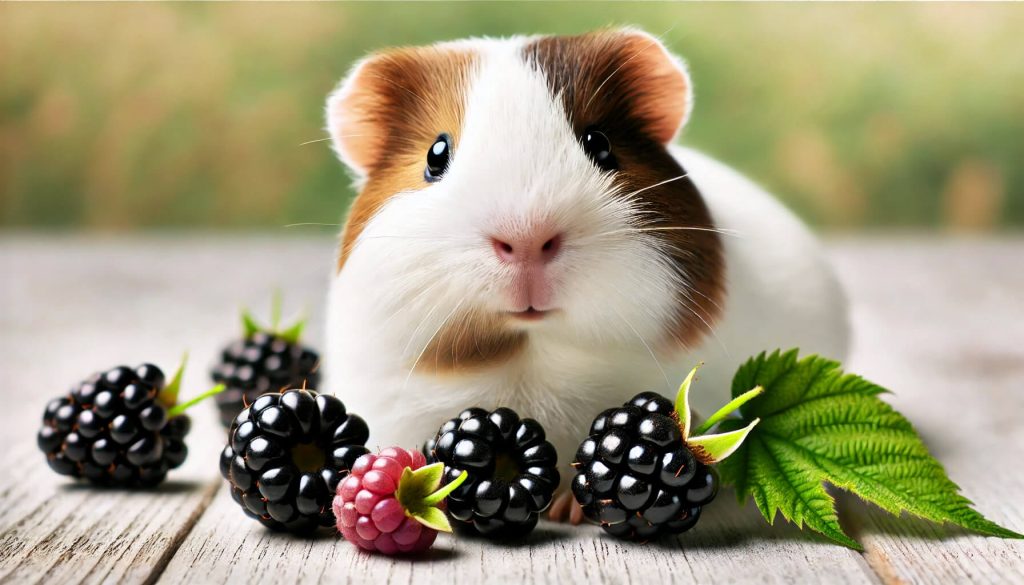
Can Guinea Pigs Eat Blackberries?
Nutritional Benefits of Blackberries for Guinea Pigs
Guinea pigs love tasty treats, and blackberries can be a nutritious addition to their diet when provided in moderation.
Vitamins and Minerals in Blackberries
Blackberries are rich in vitamins and minerals that benefit guinea pigs. Vitamin C is crucial since guinea pigs can’t produce it. Each blackberry contains up to 2.4 mg of Vitamin C. Additionally, blackberries offer vitamins A, K, and E. Minerals such as potassium, calcium, and magnesium help support various bodily functions. Potassium, found in 162 mg per 100g of blackberries, aids in muscle function and fluid balance.
Antioxidants and Fiber Content
Blackberries contain antioxidants like anthocyanins, which support immune health. These antioxidants help reduce oxidative stress in guinea pigs. Moreover, fiber content is significant for guinea pigs’ digestive systems. Blackberries have around 5.3 g of fiber per 100g, contributing to better digestion and preventing common gastrointestinal issues.
Potential Risks When Feeding Blackberries to Guinea Pigs
Blackberries offer several health benefits for guinea pigs. However, there are potential risks that come with feeding them to your guinea pig.
Sugar Content and Digestive Health
Blackberries contain sugar, which, when consumed in excess, can disrupt your guinea pig’s digestive health. Guinea pigs have sensitive digestive systems, and too much sugar can lead to diarrhea or other gastrointestinal issues. Feed blackberries in moderation, no more than 1-2 small berries twice a week, to prevent digestive problems.
Possible Allergic Reactions
Although rare, guinea pigs can experience allergic reactions to blackberries. Symptoms might include itching, swelling, or digestive upset. Introduce blackberries slowly and observe your guinea pig for any allergic symptoms. Discontinue feeding if any adverse effects occur and consult a veterinarian.
How to Safely Introduce Blackberries to Your Guinea Pig’s Diet
Introducing blackberries to your guinea pig’s diet can provide valuable nutrients. Use caution and follow guidelines for the health of your pet.
Appropriate Serving Sizes
Offer small portions of blackberries to your guinea pig. Start with one or two small berries. This approach helps you monitor for adverse reactions. Blackberries should be a treat, not a staple, so keep portions minimal. Remove seeds to avoid choking hazards.
Frequency of Feeding Blackberries
Feed blackberries sparingly. Limit them to once or twice a week. Guinea pigs need a balanced diet primarily composed of hay, vegetables, and pellets. Overfeeding fruits can disrupt this balance and impact digestive health.
By adhering to these guidelines, you can safely introduce blackberries to your guinea pig’s diet while promoting their overall well-being.
Other Safe Fruits for Guinea Pigs
Guinea pigs enjoy a variety of fruits. Adding different fruits to their diet helps provide essential vitamins and minerals. Below are safe fruits you can include in your guinea pig’s diet.
- Apple (Cored and Seeded):
Remove the seeds. Seeds contain cyanide which harms guinea pigs. Offer apple slices in moderation. - Blueberries:
High in antioxidants, blueberries support your guinea pig’s immune system. Serve a few at a time. - Strawberries:
Rich in vitamin C, strawberries strengthen your guinea pig’s immune system. Slice them for easier eating. - Melon (Cantaloupe and Honeydew):
Low-calorie with high water content, melons keep your guinea pig hydrated. Remove seeds before feeding. - Pear (Cored):
Provide a good fiber source. Remove the seeds to avoid toxicity. - Peach (Pitted):
Soft and easy to eat, peaches offer vitamins A and C. Ensure the pit is removed.
These fruits complement a diet based on hay, vegetables, and pellets. Monitor your guinea pig for any adverse reactions when introducing new fruits.
Conclusion
Feeding your guinea pig blackberries can be a delightful treat when done correctly. Remember to introduce them slowly and in moderation to avoid any health issues. Keep an eye out for any adverse reactions and always balance their diet with other safe fruits, hay, vegetables, and pellets. By doing so, you’ll ensure your guinea pig stays happy and healthy while enjoying a variety of nutritious foods.
